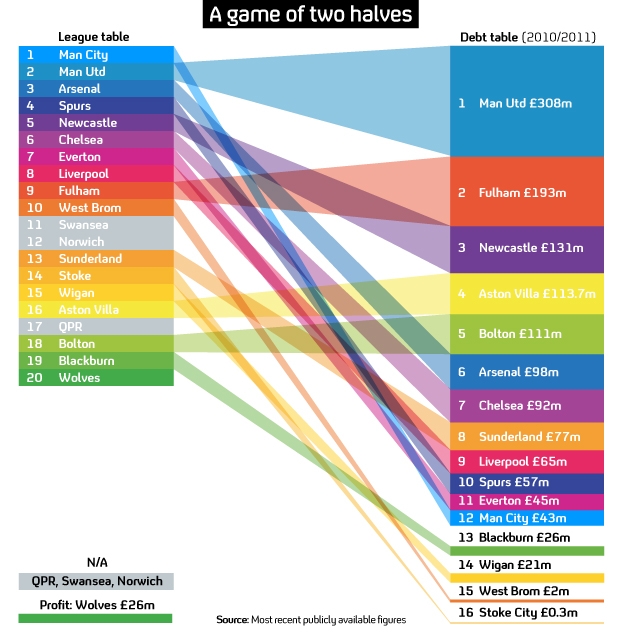Premier League: the alternative results table
In a dramatic conclusion to a nail-biting finale, Manchester City grabbed the Premier League title with seconds to spare. But when football finances are considered, was it really such a surprise?
Hundreds of Man City fans are lining the streets on Monday to celebrate winning English football’s top prize for the first time in 44 years.
But football finance expert Dr John Beech is not quite so impressed – and not just because he is a Portsmouth fan.
“You could sum it up as ‘billion-dollar-team’ beats ‘one-man-down’ team”, he told Channel 4 News. “There’s evidence that buying success is not always guaranteed, but when you buy it on such a scale as Roman Abramovich and Sheikh Mansour, it is.”

The Channel 4 News alternative league table shows the levels of debt within the Premier League (based on most recent figures available) and does not even take into account this season’s most recent epic spending. While clubs’ total spend and debt accumulation does not correlate exactly with their position based on points, the big spenders float towards the top and the teams that actually make a profit are in the minority.
It’s destroying any natural competitive balance, moving away from realms of sport to realm of entertainment. Yes it’s entertaining, but it’s not sport. It’s the uncertainty of outcome that’s being removed. Dr John Beech
Manchester City last year posted record annual losses of £195m following a spend of £175m on wages alone, funded by Sheikh Mansour bin Zayed Al Nahyan. Carlos Tevez was bought for a reputed £47m, and along with Yaya Toure receives a weekly salary of around £200,000.
City fans may be overjoyed at their last-gasp triumph at the weekend, but many believe their new-founded dominance merely confirms that the game’s finances are spiralling out of control.
“The spending of this scale started 20 years ago with the formation of the Premier League, and I do see it as ‘football selling its soul’,” said Dr Beech.
“It’s destroying any natural competitive balance, moving away from realms of sport to realm of entertainment. Yes it’s entertaining, but it’s not sport. It’s the uncertainty of outcome that’s being removed.”
Financial fair play regulations
Uefa is attempting to put teams on a more equal footing by controlling clubs’ spending, imposing a £38m cap on losses through financial fair play regulations, which will come into play from 2013 to 2015. Clubs will be fined or risk exclusion from their league if they fail to comply.
The aim is that clubs will be forced to compete on commercial revenues, so that if they make money they can spend it, but relying on hugely wealthy benefactors will not be an option.
Whether the regulations will have an impact is yet to be seen. Wyn Grant, co-editor of footballeconomy.com and professor of politics at Warwick University, is not convinced.
For a start teams may be able to mount a legal challenge, and Uefa will have to be careful about how many teams it gets rid of, he told Channel 4 News: “What they will really do is entrench the status quo. The Real Madrids, the Barcelonas, will stay top of the pile if the regulations are in fact enforceable.”
Read more: Is it the ‘English’ Premier League any more?
Long-term aim
It could take up to 10 years before Uefa’s regulations manage to equalise club’s spending – that is, if the clubs themselves play ball.
“My main concern is that fans are tending to be uncritical – all they care about is what happens on the pitch, not what happens in the boardroom,” Dr Beech said.
“But I would hope to think that within ten years, we’ll be looking back and saying ‘how on earth was this allowed to happen’.”